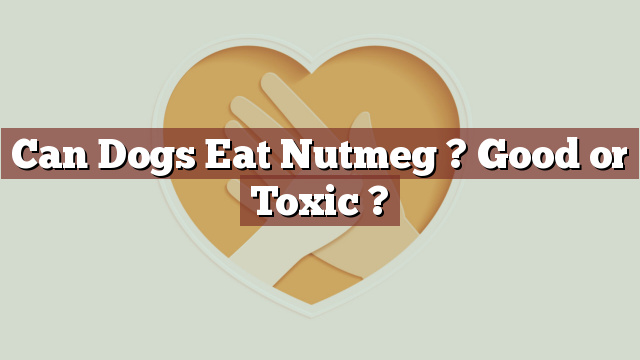Can Dogs Eat Nutmeg? Good or Toxic?
Knowing what foods are safe for our canine companions is essential for their overall health and well-being. As responsible pet owners, we need to be aware of the potential risks and benefits of certain foods before offering them to our furry friends. One such spice that often raises questions is nutmeg. In this article, we will explore the nutritional value of nutmeg, its safety for canine consumption, potential risks or benefits, what to do if your dog accidentally ingests nutmeg, and ultimately whether nutmeg should be included in their diets.
Nutritional Value of Nutmeg: Is It Safe for Dogs to Consume?
Nutmeg is a popular spice derived from the seed of the Myristica fragrans tree. It is often used in small quantities to add flavor and aroma to various dishes. Nutmeg is rich in essential oils, fiber, minerals, and antioxidants, which can provide several health benefits for humans. However, when it comes to dogs, the nutritional value of nutmeg does not outweigh the potential risks associated with its consumption.
Can Dogs Eat Nutmeg? Exploring Its Safety for Canine Consumption
Can dogs eat nutmeg? The answer is no. Nutmeg contains a compound called myristicin, which can be toxic to dogs. Ingesting even small amounts of nutmeg can lead to various symptoms, including gastrointestinal upset, vomiting, diarrhea, abdominal pain, tremors, seizures, and in severe cases, even hallucinations. It is important to remember that dogs have different metabolisms compared to humans, and what may be safe for us can pose serious health risks for them.
Veterinary experts strongly advise against feeding nutmeg or any products containing nutmeg to dogs. The potential dangers of nutmeg outweigh any potential benefits it may offer. It is always better to be safe than sorry when it comes to our furry friends’ well-being.
Potential Risks or Benefits of Nutmeg for Dogs: What You Should Know
While nutmeg is not suitable for canine consumption, it is crucial to understand the potential risks associated with its ingestion. The toxic compound myristicin can affect a dog’s nervous system, leading to various neurological symptoms. Additionally, nutmeg is known to cause gastrointestinal upset, which can be distressing for our four-legged companions.
On the other hand, there are no significant health benefits of nutmeg specifically for dogs. It is important to note that some spices, such as turmeric, can have potential health benefits for dogs when used in moderation and under the guidance of a veterinarian. However, nutmeg is not one of those spices.
My Dog Ate Nutmeg: What to Do Next and Seeking Veterinary Advice
If you suspect that your dog has ingested nutmeg, it is essential to act promptly. Contact your veterinarian immediately and provide them with all the necessary information. They will be able to assess the situation and guide you on the next steps to take based on your dog’s specific condition and the amount of nutmeg consumed. It is crucial not to induce vomiting or administer any home remedies without professional advice, as this can potentially worsen the situation.
Conclusion: Nutmeg Should Be Avoided in Canine Diets for Safety Reasons
In conclusion, it is evident that nutmeg should be avoided in canine diets. Despite its potential health benefits for humans, nutmeg is toxic to dogs and can lead to various adverse effects on their health. It is always better to err on the side of caution when it comes to feeding our dogs, and consulting with a veterinarian is crucial before introducing any new foods into their diet. By being mindful of what we offer our furry friends, we can ensure their safety and well-being for years to come.
Thank you for investing your time in exploring [page_title] on Can-Eat.org. Our goal is to provide readers like you with thorough and reliable information about various dietary topics. Each article, including [page_title], stems from diligent research and a passion for understanding the nuances of our food choices. We believe that knowledge is a vital step towards making informed and healthy decisions. However, while "[page_title]" sheds light on its specific topic, it's crucial to remember that everyone's body reacts differently to foods and dietary changes. What might be beneficial for one person could have different effects on another. Before you consider integrating suggestions or insights from "[page_title]" into your diet, it's always wise to consult with a nutritionist or healthcare professional. Their specialized knowledge ensures that you're making choices best suited to your individual health needs. As you navigate [page_title], be mindful of potential allergies, intolerances, or unique dietary requirements you may have. No singular article can capture the vast diversity of human health, and individualized guidance is invaluable. The content provided in [page_title] serves as a general guide. It is not, by any means, a substitute for personalized medical or nutritional advice. Your health should always be the top priority, and professional guidance is the best path forward. In your journey towards a balanced and nutritious lifestyle, we hope that [page_title] serves as a helpful stepping stone. Remember, informed decisions lead to healthier outcomes. Thank you for trusting Can-Eat.org. Continue exploring, learning, and prioritizing your health. Cheers to a well-informed and healthier future!

